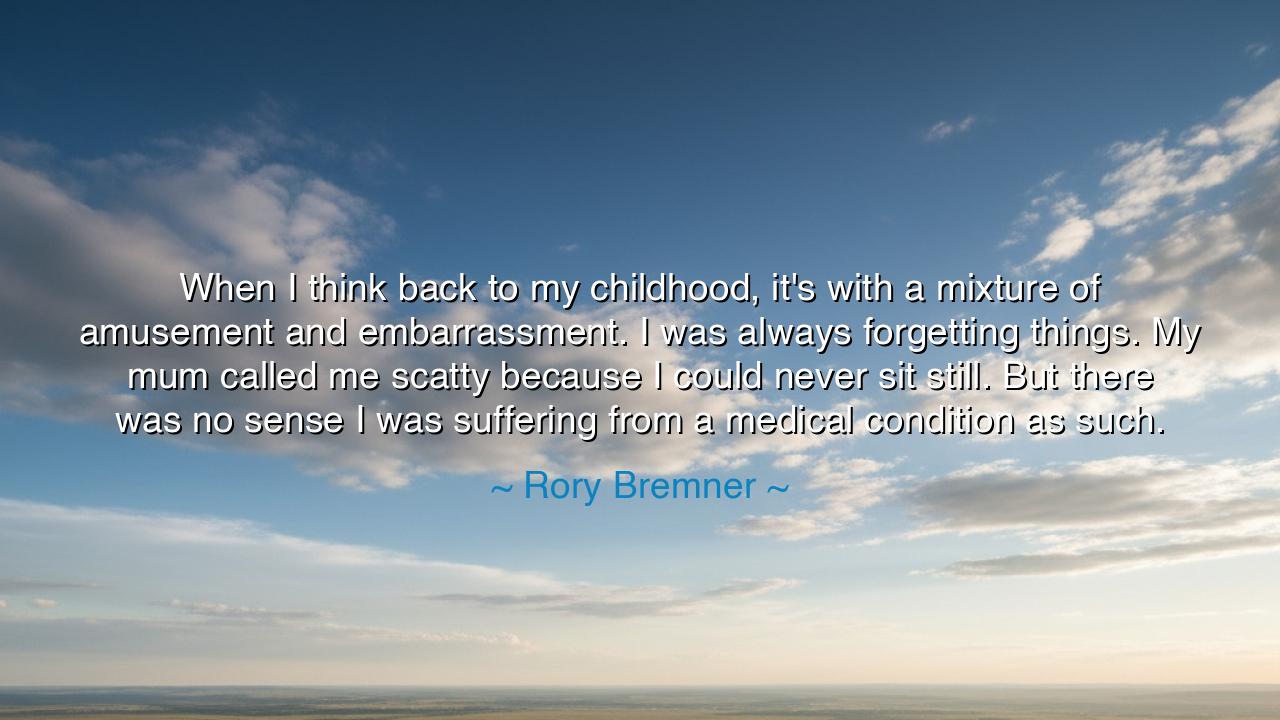
When I think back to my childhood, it's with a mixture of
When I think back to my childhood, it's with a mixture of amusement and embarrassment. I was always forgetting things. My mum called me scatty because I could never sit still. But there was no sense I was suffering from a medical condition as such.






“When I think back to my childhood, it's with a mixture of amusement and embarrassment. I was always forgetting things. My mum called me scatty because I could never sit still. But there was no sense I was suffering from a medical condition as such.” Thus spoke Rory Bremner, the famed impressionist and satirist, in words that are at once tender and revealing. Beneath their gentle humor lies a deep reflection on the changing ways humanity views the mind, the self, and the boundaries between personality and illness. Bremner’s recollection is not only a look backward, but also a commentary on a world that has learned to name and diagnose what was once simply accepted as part of human variety. His tone carries both nostalgia and wisdom — the sense that in the imperfections of youth lie both confusion and the seeds of creative brilliance.
In his words, Bremner captures the innocence of a time when restlessness was not pathologized, when forgetfulness and energy were not yet dissected by labels and acronyms. His “scattiness,” as his mother fondly called it, was not seen as a defect, but as a quirk — part of the mosaic that made him who he was. Today, such behavior might quickly be identified as a symptom of attention deficit disorder or another condition. But in his youth, it was seen through the lens of love and patience. This difference is profound, for it speaks to a broader truth: that context shapes understanding, and that compassion often perceives what judgment distorts.
In the ancient world, philosophers like Aristotle believed that temperament shaped destiny. The “choleric,” the “sanguine,” the “melancholic” — each was understood not as broken, but as uniquely gifted. The restless might become warriors, the dreamers poets, the melancholics philosophers. What modernity calls disorder, antiquity often called nature. This is the wisdom in Bremner’s reflection: that we must not always rush to label difference as dysfunction. For within that restlessness, that inability to sit still, there may lie the spark of genius, creativity, or insight that cannot thrive within the boundaries of conformity.
Indeed, the story of Bremner’s own life gives proof of this. From the “scatty” child who could not focus, he became a man of astonishing mental agility — able to mimic voices, gestures, and characters with flawless precision. His quicksilver mind, once a source of amusement and frustration, became his greatest instrument. What was once seen as a lack of focus was, in truth, an overflow of perception, an abundance of awareness that could see and feel more than most. His restlessness became motion; his forgetfulness became invention. In this transformation lies the great paradox of the human condition — that our flaws, when embraced and refined, can become the very source of our strength.
There are countless stories that echo this truth. Consider the tale of Thomas Edison, the boy dismissed by his teachers as “slow,” his mind too restless for the classroom. His mother, like Bremner’s, saw not defect but potential — and nurtured his curiosity rather than condemning it. The same restlessness that made him a poor student made him a brilliant inventor. So too with Albert Einstein, who struggled with focus and speech as a child, yet grew to reshape humanity’s understanding of the universe. The wisdom here is timeless: what appears as disorder in youth may be destiny in disguise.
Bremner’s reflection also reminds us of the importance of love’s perception. His mother did not see a medical case — she saw her child. In her eyes, “scatty” was not an insult but an affectionate truth, a word filled with warmth. From such acceptance blooms confidence; from such patience springs possibility. When a child is met with understanding rather than criticism, they learn not to fear their own difference. In this way, Bremner’s mother becomes a symbol of what all mentors and parents should strive to be: those who see the gift hidden in the struggle.
So, my children, take this lesson to heart: not every restlessness is a flaw, not every imperfection a wound. The human mind is vast and varied, and its rhythms cannot be measured by one rule. The child who cannot sit still may one day move the world; the dreamer who forgets may one day imagine what no one else can see. What matters is not to suppress such spirits, but to guide them with patience, love, and understanding.
Let this be the teaching of Rory Bremner’s words: that we must respect the wildness within us. For it is the same fire that gives rise to creation, to laughter, to life itself. Learn to love what makes you different, and to treat others’ peculiarities with compassion, not condemnation. Remember — there is wisdom in “scattiness,” beauty in imperfection, and strength in the unsteady paths of those who refuse to walk in straight lines. For they are the ones who see the world as it truly is: alive, chaotic, and full of wonder.






AAdministratorAdministrator
Welcome, honored guests. Please leave a comment, we will respond soon